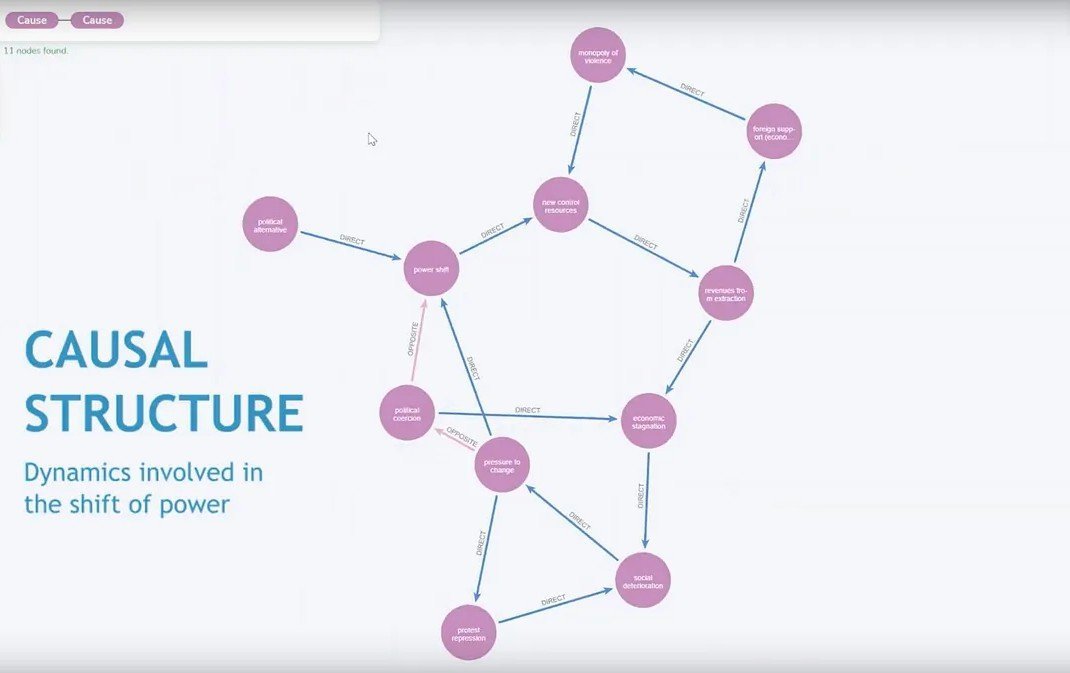
Articles and ideas

Leading Complexity As A Collective Process. A System Approach To Complex Projects
Leading complex projects means managing relationships, not parts. It requires balancing two fundamental tensions: authority versus autonomy, and control versus adaptation. No leader can reconcile these alone. Effective leadership becomes a collective process, creating conditions where stakeholders self-organise locally while maintaining system-wide integrity and coherence.

System Change on Steroids: From Checks and Balances to an Authoritarian Government. Part 2
Systems change requires a transition of power, but this can't be achieved alone, you need allies. I propose a framework to map power dynamics through meta-causal loop diagrams, which integrate people directly into maps to reveal underlying incentives and loyalty networks. This approach helps understand not just situational complexity, but how conditions influence behavior, allowing you to anticipate which dynamics might activate cooperation, resistance, or support.

System Change on Steroids: From Checks and Balances to an Authoritarian Government. Part 1

Systems Archetypes for Strategic Decision-Making. Part I. Beyond the Quick-Fix Trap
Discover why organizations become trapped in cycles of short-term fixes and struggle to implement fundamental solutions. This analysis reveals how risk perception, social disruption, and power dynamics create a self-reinforcing system where quick fixes remain the default response despite diminishing effectiveness.

7 funciones clave para desarrollar organizaciones viables y adaptables. La organización sistémica.
Las organizaciones están en un proceso constante de cambio. Para producir valor al tiempo que estas absorben los cambios del entorno y se adaptan, necesitan 7 funciones clave interconectadas que les permitirán operar de forma efectiva y mientras mantienen la cohesión del sistema social que las forman.

Paradigmas organizacionales y sus problemas estructurales.
Las metáforas que usamos para organizar el trabajo condicionan la productividad de las organizaciones y determinan los problemas estructurales que tendremos que resolver para seguir siendo viables y sostenibles.

Sanding reality.
The way we use systems thinking to understand our reality reminds me of Vietnamese lacquer painting. In this traditional art form, the complete image already exists beneath layers of lacquer, the artist reveals it through careful sanding. Just as each artist might polish different areas to varying degrees of clarity, we each focus on different aspects of reality as we try to make sense of it. With patience and dedicated effort, a richly textured and meaningful image gradually emerges.

Organisations designed for control, conformity and performance efficiency
Organizations function as societal structuring mechanisms, managing human activity and resource distribution. While these systems enabled social complexity, they're shaped by those controlling key resources. Since the 1990s, globalization has led to tech giants' dominance, challenging governmental authority and establishing surveillance as the norm in organizational-individual relationships. To maximize efficiency, organizations manage human resources through conformist culture, strict performance standards, and reduced autonomy, despite humans' capacity for resistance. Growing polarization has shifted decision-making power to systems that view people primarily as capital-generating resources, leading to what Yanis Varoufakis calls "Techno-feudalism."

Beyond system mapping. Meta Causal Loop Diagrams
Meta Causal Loop Diagrams (Meta-CLDs) are an evolution of traditional Causal Loop Diagrams that combine three dimensions: cause-effect structure, how causes affect actors and their responses, and relationships between people. They add a fourth temporal dimension and use graph databases (Neo4j) to overcome conventional CLD limitations, enabling complex situation mapping and visualising multiple connections between actors, creating a more comprehensive tool for analysing complex problems.